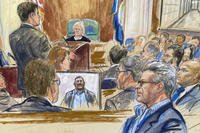"We will prosecute these men and send a clear message to those who kill Americans: No matter how long it takes, we will find you and bring you to justice."
-- George W. Bush, 9/9/06
Five years ago tomorrow, three thousand people were killed in my home town. And the bastards who masterminded this mass murder have gotten away with it, thanks in part to the actions of our government and its allies. Sure, hunting for a single, clever man in a vast world is an extremely difficult task. It gets even harder, when there's anything less than 100% commitment and focus to catching him. By now, you probably know that Pakistan has signed a "truce" with the militants who many believe are harboring bin Laden. You know that the CIA has shut down its Osama-hunting shop. But what you may not know -- and what the Washington Post reveals today -- is that there hasn't been a "credible lead" on the Al-Qaeda chieftain's whereabouts in "more than two years. Nothing from the vast U.S. intelligence world -- no tips from informants, no snippets from electronic intercepts, no points on any satellite image -- has led them anywhere near the al-Qaeda leader."
By now, you probably know that Pakistan has signed a "truce" with the militants who many believe are harboring bin Laden. You know that the CIA has shut down its Osama-hunting shop. But what you may not know -- and what the Washington Post reveals today -- is that there hasn't been a "credible lead" on the Al-Qaeda chieftain's whereabouts in "more than two years. Nothing from the vast U.S. intelligence world -- no tips from informants, no snippets from electronic intercepts, no points on any satellite image -- has led them anywhere near the al-Qaeda leader."
In an exhaustive article, the paper shows how the trail for bin Laden grew so cold. The story starts not long after the President promised that the terrorist would be caught "dead or alive."
[In a December, 2001] videotape obtained by the CIA, bin Laden is seen confidently instructing his party how to dig holes in the ground to lie in undetected at night. A bomb dropped by a U.S. aircraft can be seen exploding in the distance. "We were there last night," bin Laden says without much concern in his voice...
Only two months later, Bush decided to pull out most of the special operations troops and their CIA counterparts in the paramilitary division that were leading the hunt for bin Laden in Afghanistan to prepare for war in Iraq...
Although the hunt for bin Laden has depended to a large extent on technology, until recently unmanned aerial vehicles (UAVs) were in short supply, especially when the war in Iraq became a priority in 2003...
Bureaucratic battles slowed down the hunt for bin Laden for the first two or three years... In early November 2002, for example, a CIA drone armed with a Hellfire missile killed a top al-Qaeda leader traveling through the Yemeni desert. About a week later, Rumsfeld expressed anger that it was the CIA, not the Defense Department, that had carried out the successful strike.
"How did they get the intel?" he demanded of the intelligence and other military personnel in a high-level meeting, recalled one person knowledgeable about the meeting.
Gen. Michael V. Hayden, then director of the National Security Agency and technically part of the Defense Department, said he had given it to them.
"Why aren't you giving it to us?" Rumsfeld wanted to know.
Hayden, according to this source, told Rumsfeld that the information-sharing mechanism with the CIA was working well. Rumsfeld said it would have to stop...
In 2004, Rumsfeld finally won the president's approval to put SOCOM [the Defense Department's Special Operations Command] in charge of the "Global War on Terrorism..."
Today, however, no one person is in charge of the overall hunt for bin Laden with the authority to direct covert CIA operations to collect intelligence and to dispatch JSOC [Joint Special Operations Command] units. Some counterterrorism officials find this absurd. "There's nobody in the United States government whose job it is to find Osama bin Laden!" one frustrated counterterrorism official shouted. "Nobody!"
The President and his team rightly deserve credit for deflecting any attacks on the homeland since 9/11. They deserve credit for catching Al-Qaeda bigwigs like Khalid Sheikh Mohammed. But to let their hard-ons for Iraq and their petty infighting distract them from nailing America's number one enemy is more than frustrating. It's dangerous. They've shown would-be Osamas all over the world that you can attack America, and get off scot-free. And I'm afraid that more of my neighbors will one day pay the price for sending that awful message.








